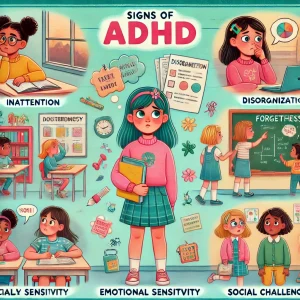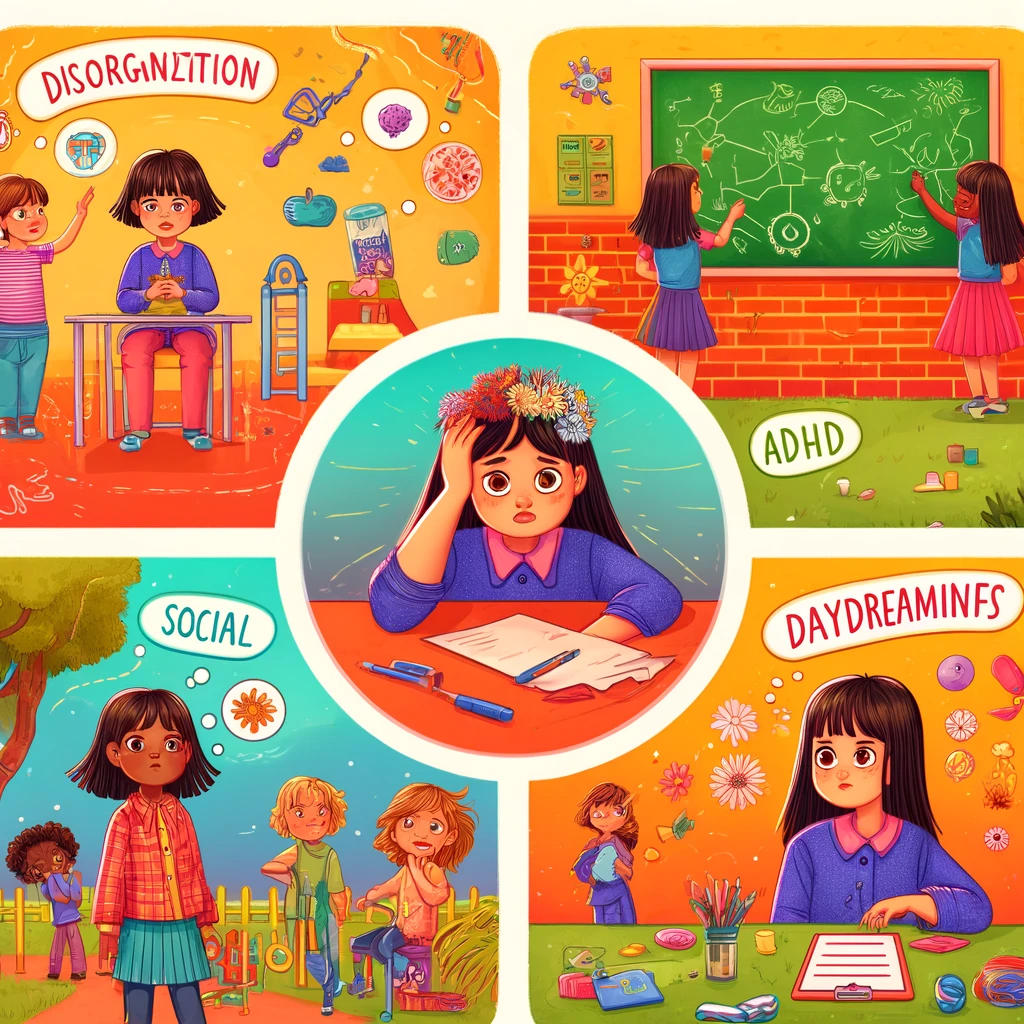What are the Signs of Adhd in Girls?
Introduction
Attention-Deficit/Hyperactivity Disorder (ADHD) is often associated with boys, leading to a significant oversight in recognizing and diagnosing signs of ADHD in girls. This misconception not only perpetuates harmful stereotypes but also delays crucial support for girls. Understanding the unique presentation of ADHD in girls is essential for early detection, appropriate intervention, and support.

The Unique Signs of ADHD in Girls
Girls with ADHD often exhibit symptoms that are less disruptive and more subtle compared to boys. This can lead to underdiagnosis and misdiagnosis. Here are some key signs of ADHD in girls to look out for:
Inattention Over Hyperactivity
Unlike boys, who may display hyperactive and impulsive behaviors, girls with ADHD are more likely to show inattentive symptoms. They may have difficulty maintaining focus, be easily distracted, and often seem to be daydreaming.
Emotional Sensitivity
Girls with ADHD may exhibit extreme emotional sensitivity and reactivity. This can manifest as frequent crying, angry outbursts, or mood swings.
Disorganization
Difficulty in organizing tasks and managing time is a common sign of ADHD in girls. Girls may appear messy in both their physical space and appearance.
Forgetfulness
Forgetting daily activities and losing track of personal items are frequent issues. This can be mistaken for carelessness or lack of motivation.
Social Challenges
Girls with ADHD may struggle with maintaining friendships and social interactions. They might appear shy, anxious, or overly silly, which can be misinterpreted as personality traits rather than symptoms of ADHD. These signs of ADHD in girls are typically missed.
Internalizing Symptoms
ADHD in girls is more likely to manifest as internalizing symptoms such as anxiety and depression, rather than the externalizing symptoms commonly seen in boys.
Recognizing Signs of ADHD in Girls
Educators and parents should be mindful of the following signs of ADHD in girls:
- Difficulty in Organizing Tasks: Girls may struggle with planning and completing tasks that require sustained mental effort.
- Avoidance of Challenging Tasks: They might avoid tasks that seem too difficult or require prolonged concentration.
- Seeming Not to Listen: Girls with ADHD may appear not to listen when spoken to directly, often because they are distracted by their thoughts.
- Frequent Daydreaming: They may get lost in their thoughts, which can be mistaken for a lack of interest or motivation.
Supporting Girls with ADHD
Support for girls with ADHD involves early detection, understanding, and tailored interventions. Here are some ways to support them:
Early Detection of Signs of ADHD in Girls and Diagnosis
Timely recognition of ADHD symptoms in girls can lead to early intervention, which is crucial for their academic and social development.
Educational Support
Adjustments in teaching methods and classroom accommodations can help girls with ADHD thrive academically. This might include providing written instructions, breaking tasks into smaller steps, and allowing for movement breaks.
Emotional and Social Support
Providing a supportive environment that fosters self-confidence and social skills is essential. Girls with ADHD may struggle with low self-esteem and social challenges.
Parental and Caregiver Education
Educating parents and caregivers about the unique challenges faced by girls with ADHD can empower them to provide better support at home.
Differences Between Signs of adhd in girls and boys
The primary difference between boys and girls with ADHD lies in the nature and visibility of their symptoms. Boys are more likely to display hyperactive and impulsive behaviors, making their condition more noticeable. In contrast, girls tend to exhibit inattentive symptoms, which are less disruptive and, therefore, less likely to be recognized. This difference in symptom presentation contributes to the underdiagnosis and misdiagnosis of ADHD in girls.
Research Insights by Stephen Hinshaw
Stephen Hinshaw, a Distinguished Professor of Psychology at UC Berkeley and expert on ADHD in girls, has conducted research that shows girls with ADHD may face a number of challenges:
- Mental Health: Girls with ADHD are more likely to experience depression, anxiety, and eating disorders than girls without ADHD. They may also be at a higher risk of self-harm and suicide, especially during adolescence.
- Social: Girls with ADHD may be more likely to be rejected by peers, have difficulty with relationships, and experience social isolation. They may also be less likely to follow directions or participate in activities, and may display aggressive behavior.
- Academic: Girls with ADHD may face increasing academic struggles.
Hinshaw's research also suggests that girls with ADHD may show a predominance of inattention and internalizing problems, while boys with ADHD may display more hyperactive-impulsive symptoms and externalizing problems. However, Hinshaw also notes that girls with ADHD often improve during adolescence and young adulthood, and that many of their symptoms become less impairing over time. Hinshaw has written over 420 articles and chapters, and 12 books on ADHD, self-harm, clinical interventions, and stigma reduction, including "Straight Talk about ADHD in Girls" and "Another Kind of Madness."
Key Points from the Review
Hinshaw's review emphasizes several critical points:
- ADHD has historically been studied primarily in boys, leading to a lack of understanding of its presentation in girls.
- The prevalence of ADHD in boys is higher in childhood, but by adulthood, the ratio between genders becomes more equal.
- Females are more likely to exhibit inattention symptoms and internalizing problems, while males display more hyperactive-impulsive symptoms and externalizing problems.
- ADHD significantly impairs girls' functioning in childhood and adolescence, with these impairments persisting into adulthood. Self-harm is a major concern throughout the lifespan for females with ADHD.
- Continued research into the developmental pathways and causal mechanisms of ADHD in females is necessary to improve diagnosis, treatment, and long-term outcomes.
Conclusion
Understanding the unique presentation of ADHD in girls is essential for early detection, appropriate intervention, and support. By acknowledging these differences and implementing strategies tailored to their needs, we can ensure that girls receive the help they need to navigate school life successfully and thrive in their personal development. Let's continue to raise awareness about ADHD in girls and break down the stereotypes that hinder their path to timely diagnosis and support.
For More Information, You Can Visit the Following Resources:
- Child Mind Institute
- Verywell Mind
- Healthline
- ADDitude
Sources
- Surman, C. B., MD. (2007, May 31). Treating ADHD in Adults With Comorbid Mood Disorders. Retrieved September 11, 2020, from Medscape
- (Womenpalooza). (2019). Depression and ADHD Women [Video]. Walden, Robert Olivardia.
- (Womenpalooza). (2017). Why Women with ADHD Are So Likely to Get Depressed [Video]. Ellen Littman, PhD.
- Riglin L et al. (2021). ADHD and depression: Investigating a causal explanation. Psychological Medicine, 51, 1890–1897. https://doi.org/10.1017/S0033291720000665
- Hinshaw, S. P., Rosenthal, E. A., O'Grady, S. M., & Nguyen, P. T. (2022). Annual Research Review: Attention-deficit/hyperactivity disorder in girls and women: underrepresentation, longitudinal processes, and key directions. Journal of Child Psychology and Psychiatry. https://pubmed.ncbi.nlm.nih.gov/34231220/
- ADDitude (2024). ADHD in Women and Girls: Why Female Symptoms Slip. ADDitude.
- Diverse Thinking Different Learning (2022). Straight Talk About ADHD in Girls with Dr. Stephen Hinshaw. Diverse Thinking Different Learning.
- Child Mind Institute (2024). How Girls With ADHD Are Different. Child Mind Institute.
- The Childhood Collective (2024). #153: Understanding ADHD in Girls with Psychologist Stephen Hinshaw. The Childhood Collective.
- Berkeley News (2002). New studies of girls with ADHD led by UC Berkeley professor. Berkeley News.






